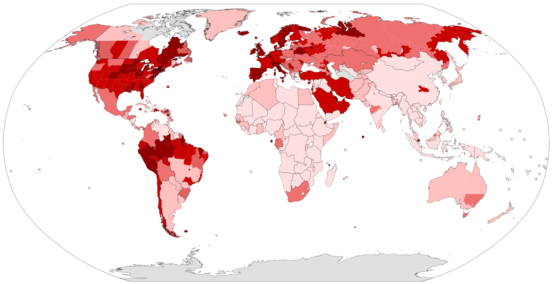“It is our task to resist the biologicalisation of this disease and instead to insist on a social and political critique of COVID-19. It is our task to understand what this disease means to the lives of those it has affected and to use that understanding not only to change our perspective of the world but also to change the world itself,” (Richard Horton, editor-in-chief of The Lancet).
Referring to renowned anthropologist Didier Fassin’s book ‘Life: A Critical User’s Manual’, in a recent editorial of The Lancet Horton alluded to the lack of science of the social in the response to this pandemic, which is a crisis about life itself. While political leaders across the world have echoed the importance of social science to inform the COVID-19 response, little has been done to support and incorporate social science in the decisions they make on the pandemic, which impacts different social groups and communities differently.
Recognising this gap, the University of Edinburgh’s (UoE) social scientists were recently granted awards from the Scottish Funding Council-Global Challenges Research Fund (SFR-GCRF) to develop innovative and timely research that would support low and middle income countries (LMIC) in the COVID-19 response.
“We are delighted to see these innovative projects that are expected to advance our understanding of social and political aspects of the pandemic. Building on past experience of the investigators and the long-standing local and international partnerships, the project outputs will directly contribute to global response to the pandemic,” said Dr Jeevan Sharma, Director of Research of the School of Social and Political Science.
The following is a brief summary of the awarded projects.
Epidemic preparedness and laboratory strengthening in West Africa
Did the international response to the 2014-2016 Ebola outbreak help to prepare Sierra Leone’s health system for COVID-19? Dr Alice Street, principal investigator of a joint project between UOE’s DiaDev and London School of Hygiene and Tropical Medicine’s (LSHTM) EBOVAC-Salone argues that technology-focused responses to epidemic emergencies – such as the development of novel diagnostics, vaccines and drugs – frequently neglect the social infrastructures that underpin the success of the technological solutions. This research draws on the team’s collective experience of carrying out research on laboratory strengthening and vaccine development in Sierra Leone and collaborations with Sierra Leone scientists and scholars to examine the impact of the international response to Ebola on the country’s current epidemic preparedness. The research will be led by research fellow, Shona Lee, who completed her PhD at the Centre of African Studies in 2018 and has since worked on the EBOVAC-Salone project, and Eva Vernooij, DiaDev research fellow . DiaDev is an ERC funded project to investigate the role of diagnostic devices in strengthening under-resourced health systems. EBOVAC-Salone is a collaboration between LSHTM Sierra Leone’s College of Medicine and Allied Health Sciences to examine community experiences of vaccine trials.
As the COVID-19 pandemic expands into Africa, social science has an important role to play in developing a culturally appropriate and socially feasible national and regional response. Dr Street says findings from this research have the potential to inform current COVID-19 testing strategies and diagnostic infrastructure development in the region, public messaging and communications, and the design and conduct of COVID-19 related research and trials.
Dr Alice Street is a senior lecturer in the School of Social and Political Sciences, University of Edinburgh and an expert on diagnostic device in global health.
Infectious disease related stigma
Experiences have shown that stigma is a common social by-product of infectious disease outbreaks which often undermine public health measures and are targeted towards patients, their families and health care workers. Dr Sudeepa Abeysinghe leads a joint project between UoE’s School of Social and Political Science (SSPS) and the University of Indonesia to look into health care associated stigma in Indonesia.
This project aims to provide policy briefings related to mitigating stigma in health care workers through the study of public narratives of risk and threat that underpin stigmatization. The goal of the project is to reduce the risks faced by personnel aiding and maintaining the health care capacity in Indonesia.
As with other LMICs of the Asia-Pacific region, COVID-19 presents a fundamental challenge to economic development and welfare in Indonesia. In highlighting and tackling stigma, this project eases the burden of stigmatisation in Indonesia and thereby impacts on the public health and wider burden of the pandemic in this context. The results from this project will also benefit other relevant actors in the region, through the sharing of insights with the SEAOHUN (South-East Asia One Health University Network) says Dr Abeysinghe.
Dr Sudeepa Abesinghe is a senior lecturer in Global Health Policy in the School of Social and Political Sciences, University of Edinburgh.
Governance and accountability
Dr Jean-Benoit Falisse is the principal investigator of the project which draws on a unique network of in-country expertise in health systems and governance to map out and analyse the governance changes that have taken place during the COVID-19 pandemic in Kenya, Somalia, South Africa and the Democratic Republic of the Congo (DRC). This is a joint project between UoE, AMREF International University in Kenya, Somali Institute of Development Research and Analysis in Somalia, Wits University in South Africa and University of Kinshasa in DRC.
The aim of this project is equip countries with better tools to understand and act on the governance of COVID-19 through cross-country exchanges and reflections between policy influencers, says Dr Falisse. The project will produce an interactive public database that can be interoperated and cross-analysed with other mapping initiatives such as the stringency of the measures of the pandemic’s spread. This database will explore the socio-political environment, the actors or institutions involved, and the nature of the governance measures. Beyond the dataset, the academic analysis will contribute to re-formulating governance in health and pandemic preparedness, says Dr Falisse.
Dr Jean-Benoit Falisse is a lecturer in Africa and International Development in the School of Social and Political Sciences, University of Edinburgh.
Lockdown diary
Dr Sarah Jane Cooper-Knock and her team are working with a team at the University of Western Cape in South Africa to continue their Lockdown Diary Project. They are interested in the politics of urban life and issues of political inclusion, which is pursued through academia, activism and policy work. When the lockdown began, this project was developed with Impact Funding from UoE and is now being run with GCRF funding.
The project involves asking people from across Cape Town to share regular WhatsApp diaries that describe their experiences of lockdown and its impact upon their communities. They currently have 70 participants from occupied buildings, informal settlements, townships and suburbs throughout Cape Town. Participants are diverse in terms of their location, age, gender, and race. The aim of the project is to share insights from lockdown with members of the public, policy makers, and responders to the crisis.
Dr Sarah Jane Cooper-Knock is a lecturer in International Development at the Centre of African Studies and Social Anthropology at the University of Edinburgh.
COVID-19 and extreme heat for poor urban population
Dr Jamie Cross of CAHSS joins with Dr Daniel Friedrich of the School of Engineering and the International Federation of the Red Cross and Red Crescent Societies (IFRC) to look at the nexus of COVID-19 and extreme heat for poor urban populations in Sub Saharan Africa, South Asia and Southeast Asia. This project will assess the impact the lockdown on existing vulnerabilities and exposure the people living in poorly ventilated housing faciliites of high density informal settlements in urban areas and prisons have as a result of heat stress and reduced access to cooling and hydration infrastructures and services during the period of lockdown and social distancing.
Dr Cross says the project involves 4000 respondents from vulnerable populations across four countries – India, Pakistan, Cameroon and Indonesia. The effects of extreme heat on poor populations is well documented and widely known to reduce labour inputs and capacity. Reducing the impact of health on health and productivity, both directly and through interactions with COVID-19 frees up capacity for the health response and for the economic activity at large, says Dr Cross.
Dr Jamie Cross is a senior lecturer in Social Anthropology and the Associate Dean (Knowledge Exchange and Impact) of the College of Arts, Humanities and Social Sciences at the University of Edinburgh.
Dr Daniel Fredrich is a lecturer at the School of Engineering, Univeristy of Edinburgh.
Information technology for COVID-19 response
Dr Larissa Pschetz leads a team at the Univeristy of Edinburgh which is collaborating with partners to investigate the potential of digital tools to help mitigate the spread of COVID-19 in Jamaica. The project uses data modelling and prototype testing obtained from social analyisis and practical experimentation to carry out their research. The project is done in collaboration with Mona Geoinfomatics, the Sir Lewis Institute of Social and Economic Studies (SALISES) at the University of West Indies in Jamaica, and the School of Computer Sciences in Univeristy of Glasgow.
The project aims to inform people and support agencies, and to optimize resources available to treat and limt the spread of COVID-19 in developing countries. Its findings will benefit Jamaica and other developing countries with similar socio-economic limitations and socio-technical characteristics. The research will feed into current efforts to map the spead of the virus and will propose guidelines and recommendations for development of future technological applications.
Dr Larissa Pschetz is a lecturer in Design at the University of Edinburgh.
Using COVID-19 for risk ADAPTATION for climate change challenges
Vulnerable communities across the globe give insights on how to adapt to unprecedented risks of climate change through their recent changes to social and economic practices under COVID-19. Through collective action these communities minimise their COVID-19 exposure and adapt to challenges such as shortages of food and access to clean water through, for example, re-farming land and bartering goods.
Such collective actions managing these new risks have been scare for other grand challenges such as climate change. “Collective action under COVID-19 can provide an insight on potential strategies and solutions for future climate change challenges,” Dr. Kathi Kaesehage, the principal investigator for this project explains, “It is of upmost importance to understand the new evolution of collective action and to preserve and replicate their structures and characteristics for the mitigation and adaptation other unprecedented risks such as climate change.”
An interdisciplinary team of researchers at the University of Edinburgh are working to understand COVID-19 risks in ways that recognise and adapt the practices and capabilities of vulnerable communities living in the intersection of urban-rural areas. The project approaches this challenge from the standpoint of analysing COVID-19 risk mitigation strategies through a case study approach with three communities in urban areas of Mexico, Colombia and the Galapagos Islands. Building on the collaborative relationships generated by previous research the team is working with local academics and community members in each location resulting in data that be co-produced. The outcomes will generate context-specific knowledge but also provide examples of best practice for similar risks such as climate change.
Dr Katharina Kaesehage is a Lecturer in Climate Change and Business Strategy, Business School and the Director of Research at the Centre for Business, Climate Change, Sustainability at the University of Edinburgh.










Comments by Ritti Soncco